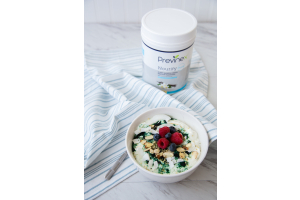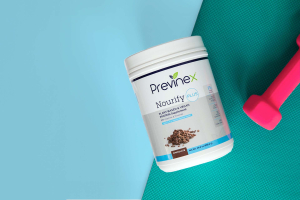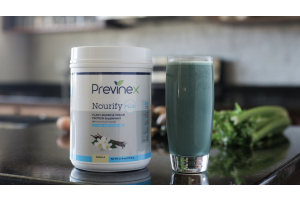
The children’s section of the vitamin aisle has become as overwhelming as the adult vitamin section. With everything from old classics to new chewables and gummies, there are many different children’s vitamin options to choose from. With all this conflicting information how are parents supposed to know what they’re kiddos vitamin needs are? Let’s take a look at the things kids really need from their daily multi-vitamin.
Vitamin A
Vitamin A is required for normal growth and development, successful tissue and bone repair, as well as healthy skin, eyes, and immune responses. According to the World Health Organization, “vitamin A deficiency (VAD) is the leading cause of preventable blindness in children and increases the risk of disease and death from severe infections.” For kids ages 1 to 3 years 1,000 international units (IU) is recommended each day. Kids 4 and up should include around 1,300 IU daily.
Vitamin B Family
The family of B vitamins plays many different roles in children’s bodies, including helping with metabolism, energy production, and healthy circulatory and nervous systems. Unfortunately many kids aren’t getting enough and are quietly suffering. Symptoms of vitamin B deficiency are often vague and mimic those of common illnesses. Thing like nausea, abdominal pains and even vomiting can occur with extended deficiency. More common symptoms include loss of appetite, bad breath, indigestion and constipation. Children’s bodies need 13 different B vitamins. Most parents have heard of vitamin B1 (thiamine), B2 (riboflavin), B3 (niacin), B6, vitamin B12 and folic acid. However our kiddos also need vitamin B5 (pantothenic acid), biotin, PABA, choline, and inositol. These water-soluble vitamins are critical to kids health.
Vitamin C
We all know that adequate levels of this immune boosting compound will help ward off colds and other illnesses. What many parents do not know is that vitamin C is key in the promotion of healthy muscles, connective tissue, and skin. Even the most citrus loving youngsters may still not be getting enough to grow, develop and stay healthy. According to the National Institutes of Health (NIH) children should get minimally the following amount of vitamin C each day.
- Toddlers 1-3 years old - 15 mg per day
- Children 4-8 years old - 25 mg per day
- Children 9-13 years old - 45 mg per day
- Male teens 14-18 years old - 75 mg per day
- Female teens 14-18 years old - 65 mg per day
Vitamin D
Vitamin D is important for the promotion of bone and tooth formation and helps kid’s absorb the calcium they need to grow. The main way we have historically gotten our recommended daily amount of vitamin D was through sun exposure. The problem is that most parents follow important sun protection guidelines and lather their children in sunscreen. While this is important to protect the skin and avoid future problems from too much sun exposure, it impacts our vitamin D levels. This has led to a steady rise in the amount of vitamin D deficiencies in kids across the world.
Calcium
In a 2004 Canadian Community Health Survey experts found that almost 25 percent of kids ages four to eight had inadequate levels of the mineral calcium. Additionally, more than one-third of boys ages nine to eighteen and over two-thirds of girls of the same age did not get enough. Kids need adequate calcium levels in order to build strong bones as they grow. It is recommended that kids 4-8 get 1,000 milligrams per day, and 1,300 milligrams per day for kids 9-13. For many kids this means that their dinnertime cup of milk just isn’t enough.
Iron
Iron is an important juvenile building block as it helps with the building of muscles and is essential in the creation of healthy red blood cells. The rates of iron deficiency spike during adolescence, especially for girls as they begin to menstruate. In a 2011 study researchers evaluated children between the ages of 6 and 59 months were admitted to the hospital. They found that 56.6 percent of the 595 children in the study were anemic. Additional studies estimate that at least a third of all people are anemic at some point in their life. With a rising trend of juvenile anemia, a supplement with iron is a must. Kids between 4 and 8 should get a total of 10 milligrams a day, and 8 milligrams a day after age 8.
Vitamin E
Vitamin E is a great immunity booster and works to help kids body’s battle germs. It also helps keeps blood vessels open wide to allow for healthy blood flow. Because the highest concentrations of E are found in foods like almonds, wheat germ, kiwi and spinach, a growing number of children are not getting the E they need from their diets. A multi-vitamin that includes E is a building block to healthy development.
Vitamin K
Research on the link between vitamin K and children’s health may still be in its infancy, but more doctors are recognizing the importance of this vitamin. In clinical trials, experts have found that K vitamins help in bone density and strength, and also protect against dangerous arterial calcification. A 2008 study showed that upping vitamin-K levels in kids over a 2-year period resulted in stronger and denser bones.
Zinc
We usually don’t think much about zinc until we come down with a cold and want to shorten how long we are under the weather. However, studies have shown that many kids are not getting the daily amounts of zinc they need for immunity and brain development. Kids between 7 months and 4 years should get 3 milligrams of zinc each day. From age 4 to 8, kids need 5 milligrams of zinc daily and 8 milligrams from 9 to 13.
Folate
Folate does many different things in kid’s bodies, ranging from the creation of DNA to making red blood cells to avoiding certain diseases. In years past, when our diets were more varied, we did a better job of getting the folate we needed through our diet. This is becoming less and less the case. Multiple health experts have suggested the following folate daily intake levels:
- Babies 0-6 months - 65 micrograms
- Babies 7 to 12 months - 80 micrograms
- Children 1-3 years - 150 micrograms
- Children 4-8 years - 200 micrograms
- Males 9-13 years - 300 micrograms
- Males over 13 years - 400 micrograms
- Females 9-13 years - 300 micrograms
In an ideal world our kids would get all of their dietary needs met by the food they eat. Unfortunately with crazy schedules and many meals eaten on the go, many families fall short. This is where a high quality, well-balanced children’s vitamin becomes a hero. Finding a multi-vitamin that includes the vitamins and minerals many kids lack, you can be sure your kiddo’s are getting what they need to stay healthy and strong.






